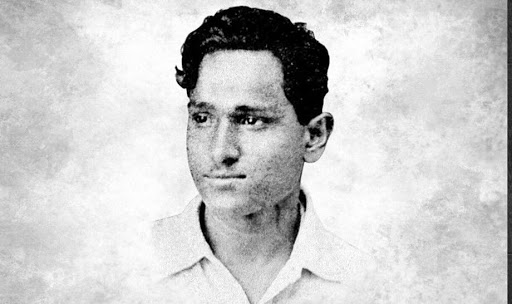Today marks the 55th death anniversary of Batukeshwar Dutt (1910–1965), who was an Indian revolutionary and freedom fighter. Born into a Brahmin family in 1910, in the village of Oari (in present-day West Bengal), he grew up and studied in Cawnpore (Kanpur, UP). It is here that he meets Bhagat Singh in 1924 and later became a close associate of Chandrashekhar Azad.
He joined the Hindustan Socialist Republican Association (HSRA) and got involved in revolutionary activities. The HSRA was established in 1928 at the Feroz Shah Kotla, New Delhi by Chandrasekhar Azad, Ashfaqulla Khan, Bhagat Singh, Sukhdev Thapar, and Jogesh Chandra Chatterjee. It had previously operated from 1924 as the Hindustan Republican Association (HRA). The name change indicated the organisation’s move towards Marxism and its goal of revolution. They aimed to overthrow the colonial British state and establish a “Federal Republic of the United States of India”, in which all systems of exploitation would be abolished.
The bombing of the Central Legislative Assembly
On 8 April 1929, Batukeshwar Dutt and Bhagat Singh stormed into the Central Legislative Assembly and threw two smoke bombs at empty treasury benches, being careful to ensure that there were no casualties in order to highlight the propagandist nature of their action.
“If the deaf are to hear, the sound has to be very loud”, the two revolutionaries explained at their trial for the bombing.
Dutt and Singh made no attempt to escape and courted arrest while shouting slogans of ‘Inquilab Zindabad!’ (‘Long Live the Revolution!’) and Samrajyavad ka nash ho’ (Down with Imperialism). They scattered leaflets titled “To Make Deaf Hear” that explained that this bombing was an act of opposition to the regressive and unpopular Trade Disputes and Public Safety Bills which were being presented in the Central Assembly. Both acts were drafted in an attempt to counter the effects of revolutionary activities and trade unionism.
“If the deaf are to hear, the sound has to be very loud”, the two revolutionaries explained at their trial for the bombing.
Mr. MK Gandhi, a proponent of non-violence was highly critical of HSRA methods and the use of bombs and called their actions as “cowards” and “dastardly”.
In response to Gandhi’s criticism of them, these young revolutionaries responded; “has Gandhi, during recent years, mixed in the social life of the masses? Has he sat with the peasant round the evening fire and tried to know what he thinks? Has he passed a single evening in the company of a factory labourer and shared with him his vows?”…“We assure Gandhi that the average Indian, like the average human being, understands little of the fine theological niceties about Ahimsa and loving one’s enemy…we affirm that the masses of India are solidly with us because we know it from personal experience”.
Fight for Prisoners’ Rights
Sentenced to imprisonment for life, Dutt was held at the Cellular Jail in Andaman and Nicobar Islands. Along with Bhagat Singh, Dutt participated in the infamous prison historic hunger strike where they demanded the status of ‘political prisoners’ and protested the differential and discriminatory treatment between white prisoners and Indian prisoners. This hunger strike attracted a lot of media attention and helped towards the improvement of prison conditions.
Batukeshwar Dutt contracted tuberculosis after he was released from prison. However, this did not stop him from participating in the Quit India Movement of 1942, due to which he was again imprisoned.
Death and Legacy
After Independence, the Indian State did not confer Dutt any recognition for his participation in the anti-colonial struggle. He lived in poverty, and some have lamented that “a revolutionary like Batukeshwar Dutt had to work as a cigarette company agent, shuttling between Patna’s tobacco shops, or sell biscuits and bread for a living”. He also worked as a tourist guide to support his family.
In 1964, Dutt was diagnosed with cancer at AIIMS in Delhi. After years of non-recognition, the then chief minister of Punjab met Dutt in the hospital and offered some financial aid for his treatment. Dutt died of the illness on 20 July 1965. As per his last wish, he was cremated in Hussainiwala, Punjab, where Dutt’s comrades – Bhagat Singh, Rajguru, and Sukhdev – had also been cremated.
As one commentator noted; “Batukeshwar Dutt [has] been forgotten by this death-worshipping, idol-worshipping country, simply because he made it through the freedom struggle alive”.




[…] Also Read: Batukeshwar Dutt: A Forgotten Revolutionary […]